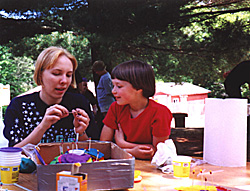Feature
Summer Blast
05.26.05
| Who are NASA's Space Science Explorers? The scientist studying black holes in distant galaxies. And the engineer designing robotic instruments for probing hard-to-reach planets. But also the teacher explaining the mysteries of the cosmos. And the elementary schooler wondering if life exists anywhere besides Earth. All of these people are Space Science Explorers -- they are all connected by their quest to explore and understand our solar system and universe. This monthly series will introduce you to NASA Space Science Explorers, young and old, with a variety of backgrounds and interests. Nominate a Space Science Explorer! Tell us about the Space Science Explorers you know. We're looking for students, teachers, scientists and others who have a connection to NASA, whether they work for the agency or are involved in a NASA-supported mission or program. Send your nominations to Dan Stillman: dan_stillman@strategies.org. |

|
Image to right: Krista (right) and Camp Little Cloud counselor Sonya Green work on a solar system activity. Credit: NASA
It was nearly four years ago that Krista and hundreds of other girls at Camp Little Cloud, a Girl Scout camp for ages 6-18, were introduced to the world of space science. The summer of 2001 was indeed an exciting one for the camp, located 14 miles west of Dubuque, Iowa. For the first time, NASA educators trained camp staff in hands-on solar system activities, and NASA scientists came to visit the campers and counselors, encouraging them to explore the universe and dream big.
Krista listened intently to the scientists, who would explain how the bed of a creek was a lot like the surface of Mars, and how robotic spacecraft are used to explore the solar system. It wasn't long before Krista discovered that she, too, was a scientist. That, in fact, was the message the visitors from NASA had hoped to communicate: that we are all scientists.
Rocks seemed to fascinate Krista most. She walked around camp with a pocket full of stones and often gave people what she called "friendship rocks" -- small limestones with tiny holes worn by erosion. So it was only fitting that one day Krista was on the receiving end of a rock, a small piece of hematite given to her by Jackie Allen, a NASA geologist and educator.
Jackie told Krista that the rock was similar to what they expected to find on Mars. Jackie also told her that in the next 30 years there would likely be a woman on Mars, and that maybe it could be Krista. Since then, Krista has maintained her interest in rocks and in 2003 completed the "Rocks Rock" Junior Girl Scout badge. In earning the badge, Krista learned from a local geologist how rocks and minerals are formed and explored geology careers.
Krista wasn't the only one inspired that summer to dream and explore. As she and I would stare at Mars, visible just above the roofline of our cabin at dusk, she would talk about her rock "from Mars," and I would talk about being an astronaut. But it wasn't just talk. I decided to follow my dream and applied to be a NASA Educator Astronaut. Although I ended up not being accepted to the program, Krista says that she will someday go to space for me.
Now 11 years old, Krista is a bit more advanced in her terminology. Instead of "a rock scientist," she now wants to be "either a geologist or the first woman on Mars." Krista will probably have some competition. In the past four years, space and exploration education has become a fundamental part of our camp program. It is as much a part of the campers' experience as archery, nature education, and arts and crafts.
One of our slogans at camp has been "Girls Can Do Anything." That means breaking through the traditional molds and enabling girls to do math and science, to have fun being smart and to stretch their limits. What could be better for our children, especially young girls, than to be given not only the academic knowledge to understand our solar system, but also the desire to explore the universe?
The author, Debby Stork, is the director of Camp Little Cloud, a seventh-grade science teacher and the proud mother of two Girl Scouts. NASA works with Girl Scout trainers across the country to bring educational content in all areas of space science to thousands of young girls.
See previous Space Science Explorers articles:
+ View site
Related Resources
NASA's Solar System Exploration: Girl Scouts
+ View site
Solar System Lithograph Set
+ View site